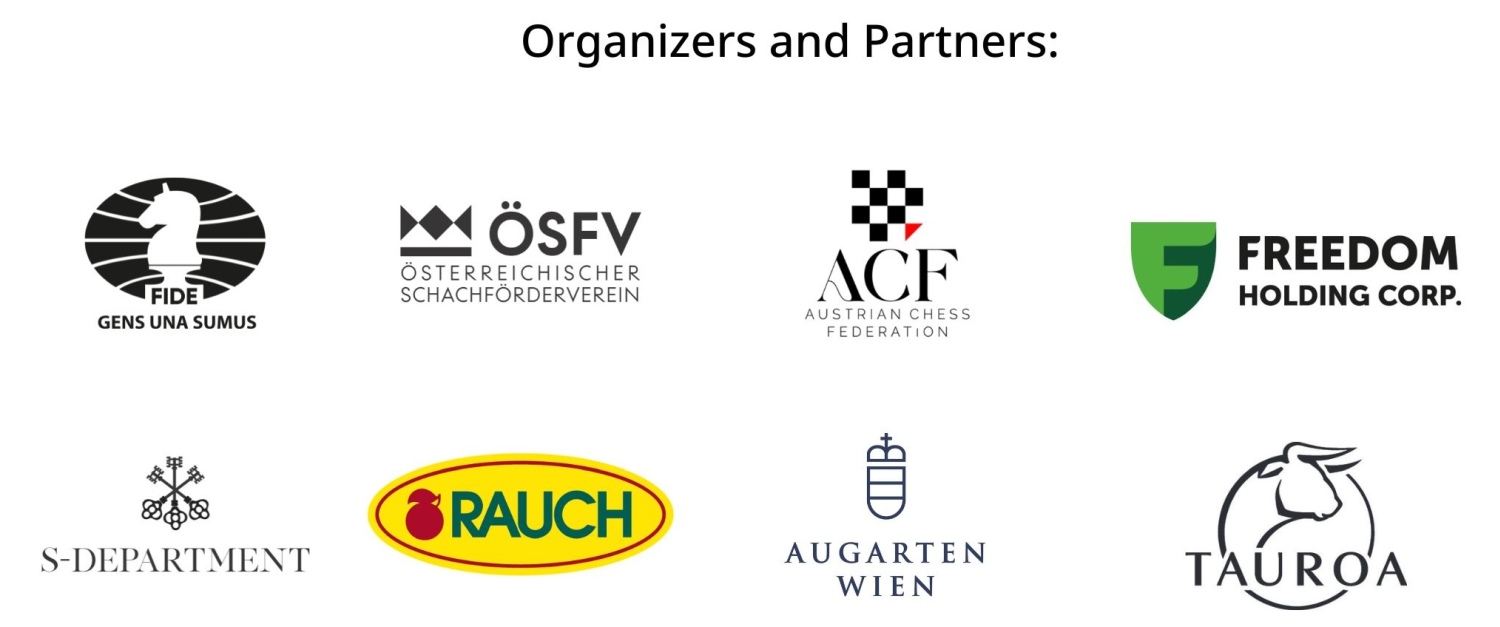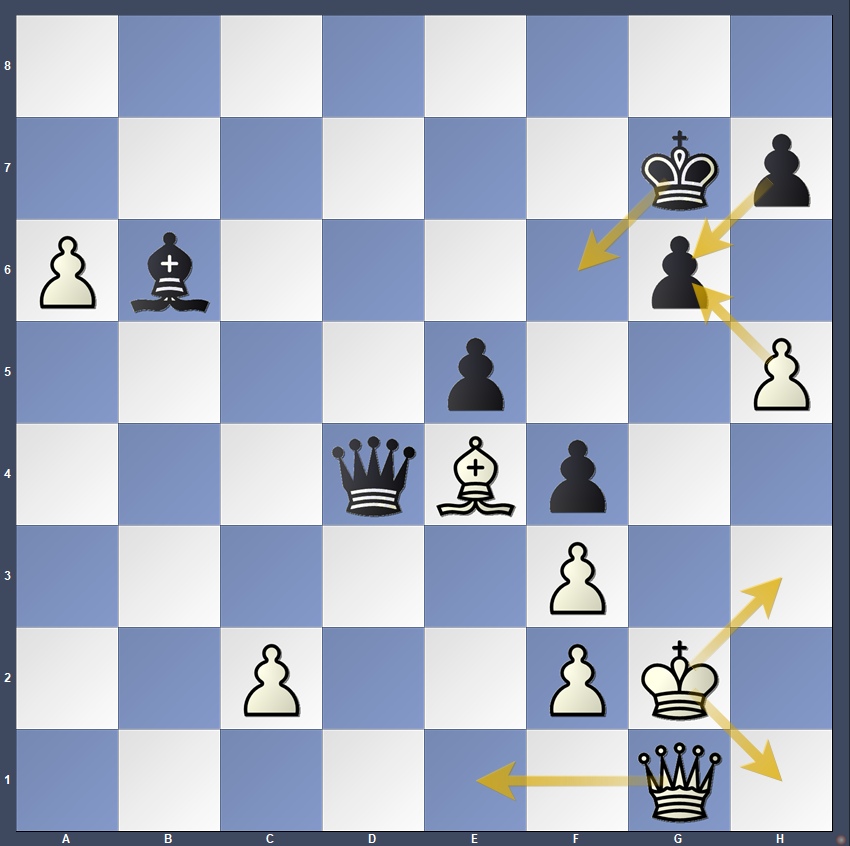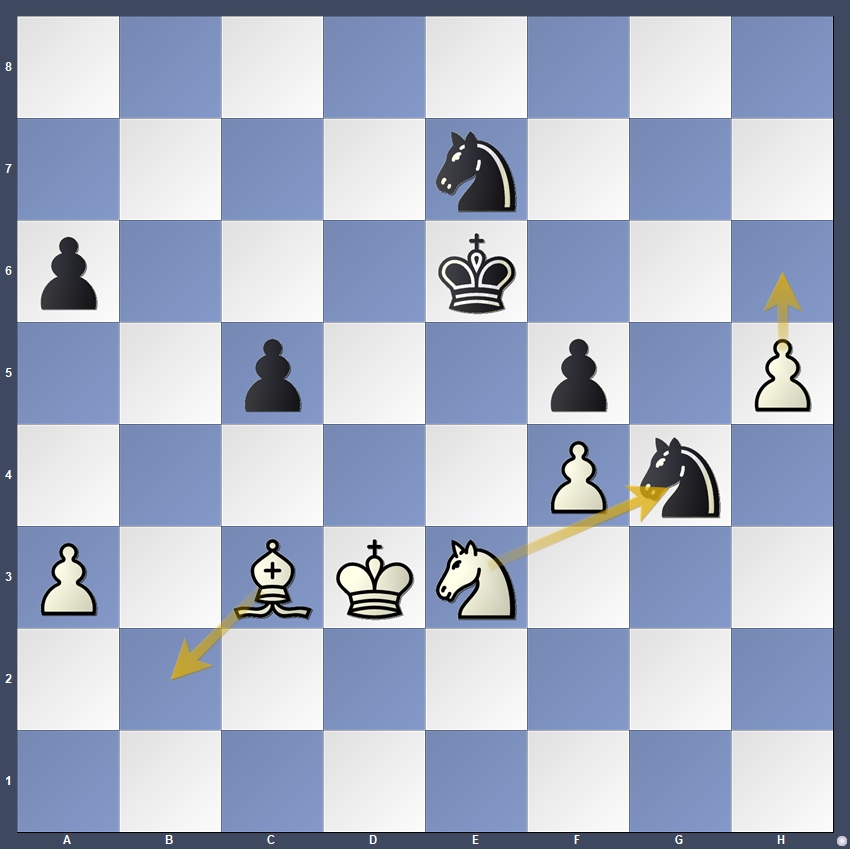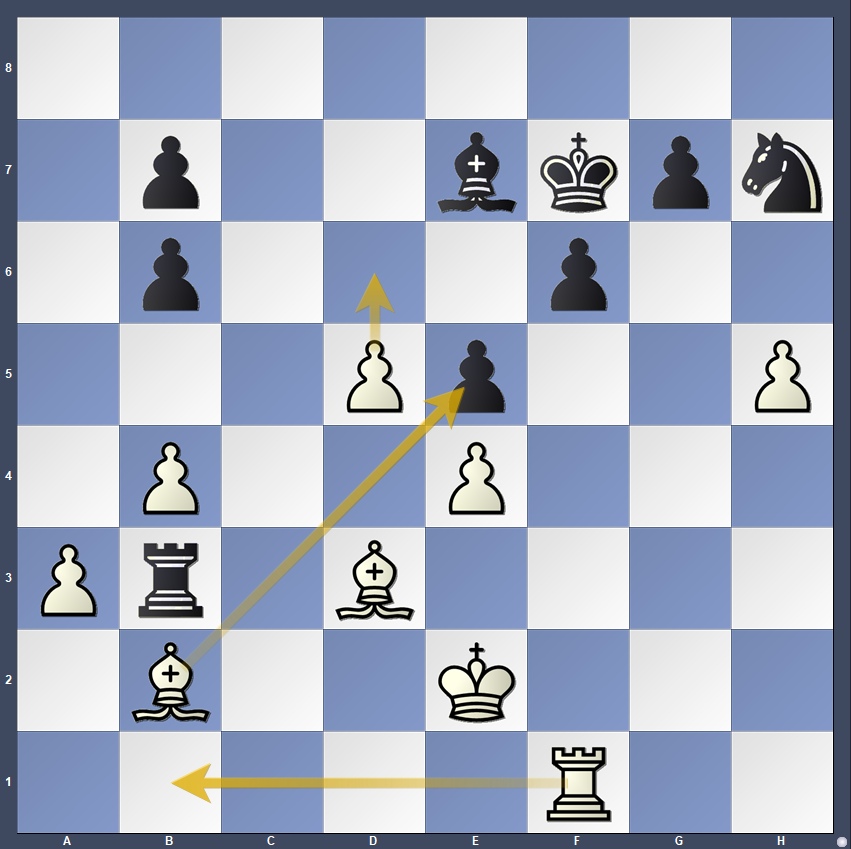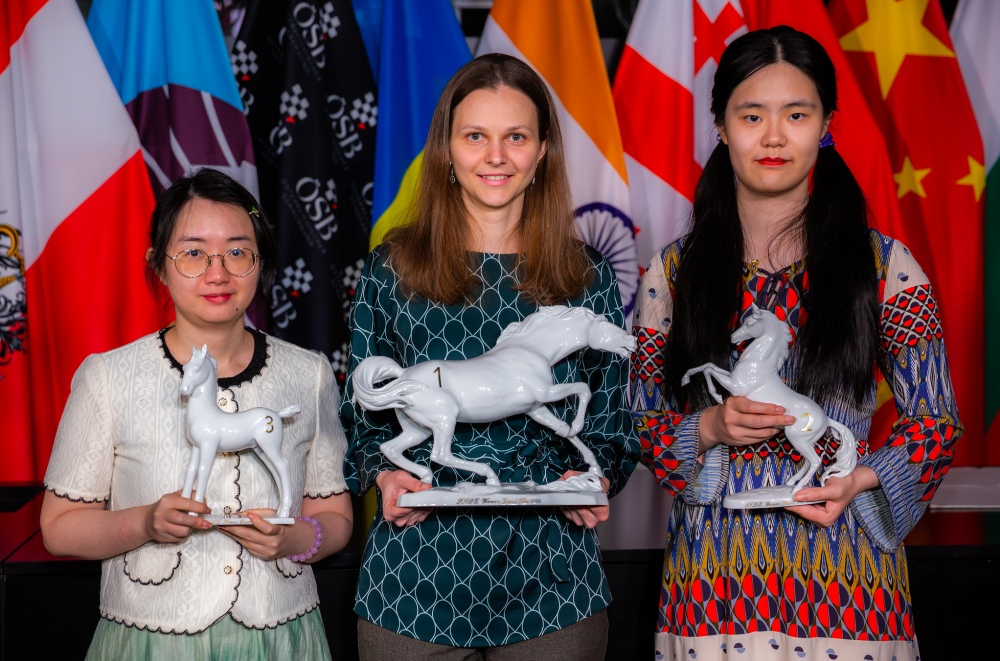
Anna Muzychuk claimed a bittersweet victory in the final leg of the Women’s Grand Prix. Despite sharing first place, it wasn’t enough to secure a slot in the Candidates Tournament. With the overall Grand Prix points tallied, Zhu Jiner emerged as the winner of the 2024/2025 series, with Aleksandra Goryachkina taking the second qualifying spot for the Candidates.
Spanning six tournaments from Europe to India and back, with 23 players, the 2024/2025 Women’s Grand Prix concluded with Zhu Jiner atop the standings and Aleksandra Goryachkina securing the second spot for the 2026 Candidates. Anna Muzychuk is third.
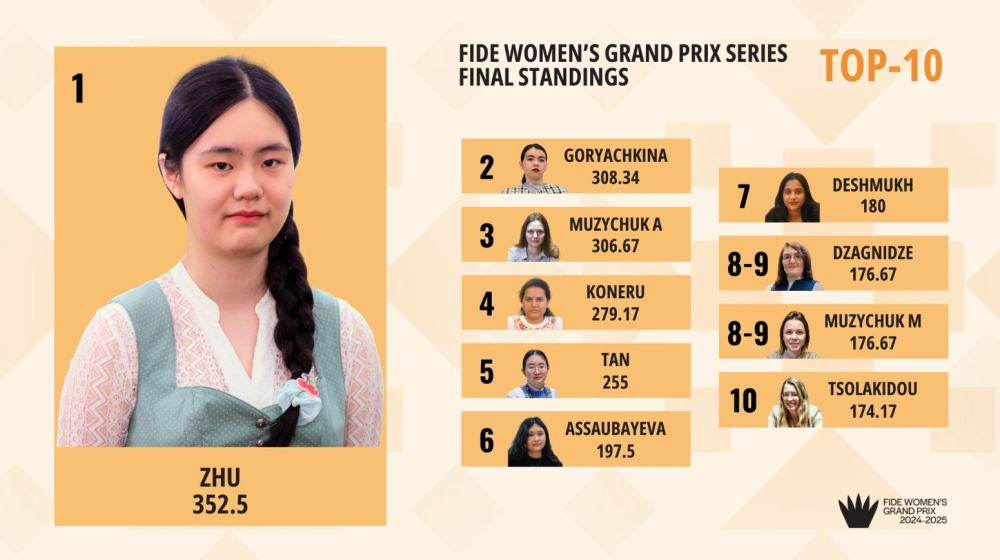
Drama in Grosslobming
All five games saw sharp positions and tough struggles – a deserving end to a cycle of six spectacular tournaments in women’s chess.
It was a make-or-break day for Anna Muzychuk. A win as White against Vaishali Rameshbabu in the final round in Austria would seal a hat-trick of triumphs: sole victory in the tournament, the overall win in the 2024/2025 FIDE Women’s Grand Prix Series, and a spot in the 2026 Candidates Tournament (edging out Aleksandra Goryachkina who was in the lead). But all of it hinged on this one game.
The game saw the French Defence – one of the oldest and most solid openings in chess. Anna managed to win a pawn and create a passer on the a-file, which offered her some chances. On the other hand, Vaishali had compensation in the activity of her pieces. The position was even until the first move after the time control, when Vaishali gave a chance to White.
Muzychuk just played h5. Her king and queen pinned to h2, she had to look for an opportunity to press on. The best choice for Black was to take on h5, but she played …41.Kf6? 42.hxg6 hxg6 Now White should have moved her king, either to h3 or – a computer move – h1, opening the attack on g6. Instead, Anna went for Qe1 and a few more moves down the road the game ended in a draw.
By this point, Zhu had already drawn her game with Alexandra Kosteniuk (being completely lost at one point, in the endgame), and Tan spoiled a winning position against Muzychuk to end up in a tie. This meant that Anna Muzychuk would share first place with Zhu, but emerge first because she played more games with the black pieces.
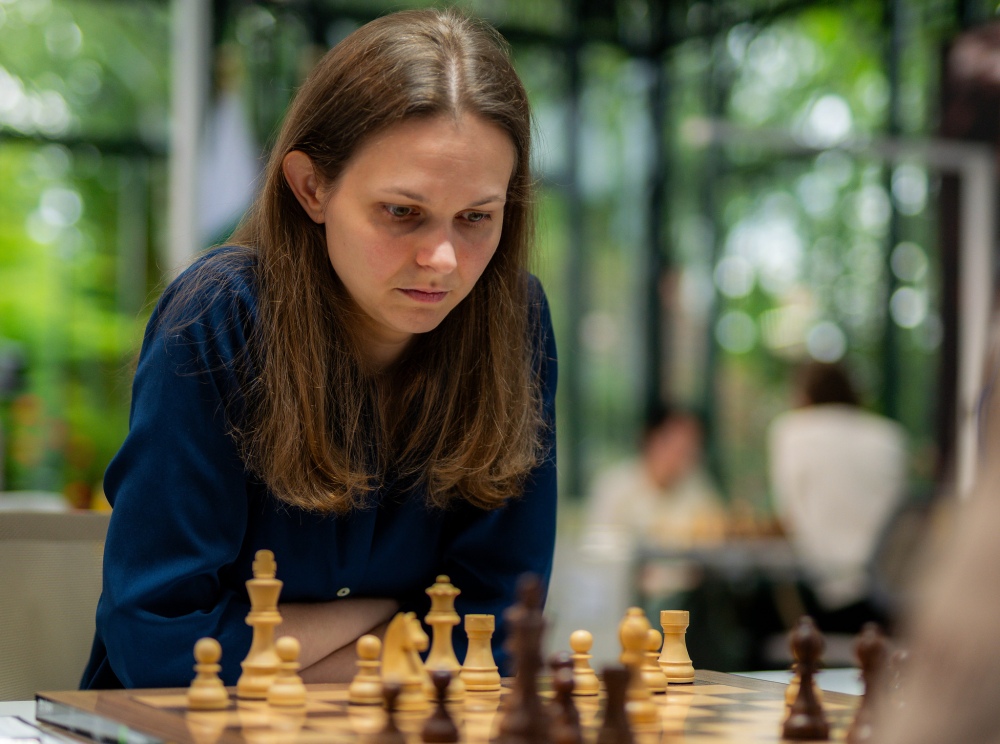
When a victory in the tournament isn’t enough
After her final game, Anna – the winner of the Women’s Grand Prix in Austria – stood silently in front of the playing hall, gazing in the distance. The scene told the story. She was sad and disappointed, on the brink of crying.
Had she won, she would have been in sole first. Had Kosteniuk played the right move in the endgame against Zhu, she would have won, and then a draw would have sufficed for Anna to take sole first place. Despite winning two out of three Grand Prix she played in (in Cyprus and in Austria), Anna didn’t qualify for the Candidates.
When asked how she feels, Anna Muzychuk responded: “It has never been so sad to win an event”. Despite emerging in first place, Anna Muzychuk failed toclaim sole victory, which meant she did not get all of the 130 points needed to clinch the spot in the Candidates.
Despite being very emotional, as a true professional, Anna Muzychuk patiently waited after the game and gave an interview which will be remembered for one line: “I won the last two Grand Prix tournaments, but still it wasn’t enough to qualify [for the Candidates] and that’s the sad thing about it.”
China’s Zhu Jiner wins the Women’s Grand Prix
The day ultimately belonged to China’s Zhu Jiner. She came to Austria with 235 points. Zhu had the best chance to overtake Goryachkina for first place in the WGP and in the end, tying for first place in Austria, she succeeded.
“I’m very happy with my performance and how I played. I have also learnt a lot and I enjoyed it,” said Zhu.

Zhu played the final round game with Alexandra Kosteniuk. This match was important for Zhu – she had to win to stand a fair chance of taking first place in the event. But doing that against a former Women’s World Champion and seasoned player like Kosteniuk is not an easy task.
Zhu opted for the Nimzo-Indian Defence and got a very comfortable position. By move 16, the queens and a pair of minor pieces were off the board and Black reached equality. White had a worse pawn structure, but the active knight on f5 outweighed this shortcoming. After a couple of Zhu’s mistakes, Alexandra got an overwhelming position, but let her advantage slip away with one careless move.
After 46.Nxg4 hxg4 47.h6 (the evaluation is +6 in White’s favor as Black’s king can’t reach the a8-square after giving up the knight for White’s h-pawn) Zhu most likely would have lost, opening a clear path to Anna Muzychuk to first place in the tournament and a spot in the Candidates!
However, Alexandra played 46.Bb2? and after 46…Nxe3 47.Kxe4 Nd5+ the game was eventually drawn.
Tan Zhongyi in third place after dropping a victory
Tan Zhongyi completely misplayed a winning position against former women’s world champion Mariya Muzychuk, throwing away a chance to tie for the first place. In the Slav, Black (Muzychuk) had two doubled pawns on the b-file, but the position was roughly even. However, time-trouble kicked in for Mariya who ended up a piece down.
White is completely winning. But the conversion did not go well at all. On the contrary.
34.Rb1 34.Bxe5 with the idea of 34…Rxa3 35.d6 was even stronger.
34…Ng5 35.Bc4 Rh3 36.d6+! Ke8 37.Bb5 Kf7 38.dxe7 White is still winning. To top it all, Mariya was in significant time trouble, while Tan had more than an hour on the clock.
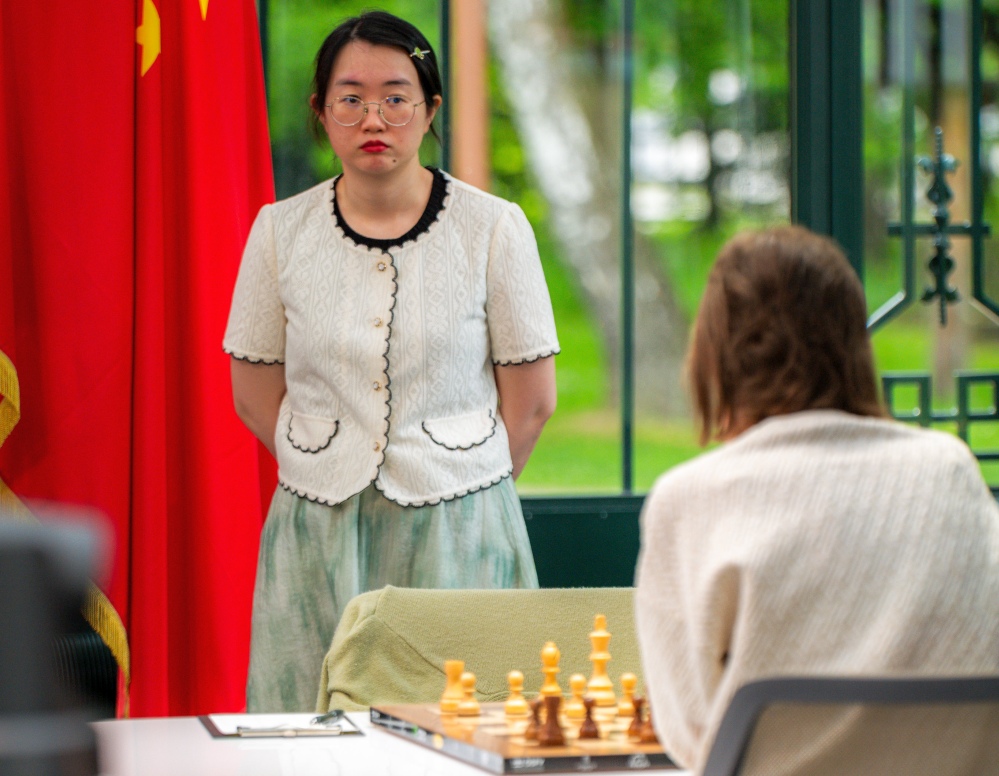
However, as the game progressed, Tan completely lost her way and Black got counterplay, with her rook and pawns on the queenside.
Visibly upset, Tan stormed out of the playing hall. The silence was punctuated by a sharp bang of the door slamming behind her.. On the other side was Mariya Muzychuk, still in the playing hall – checking out her sister’s game, coming to terms with her lucky break.
Bulgaria’s Nurgyul Salimova played a sharp game with Georgia’s Lela Javakhishvili. In the Nimzo Indian, Salimova overlooked a pawn in the critical moment of the middlegame after which her position collapsed.
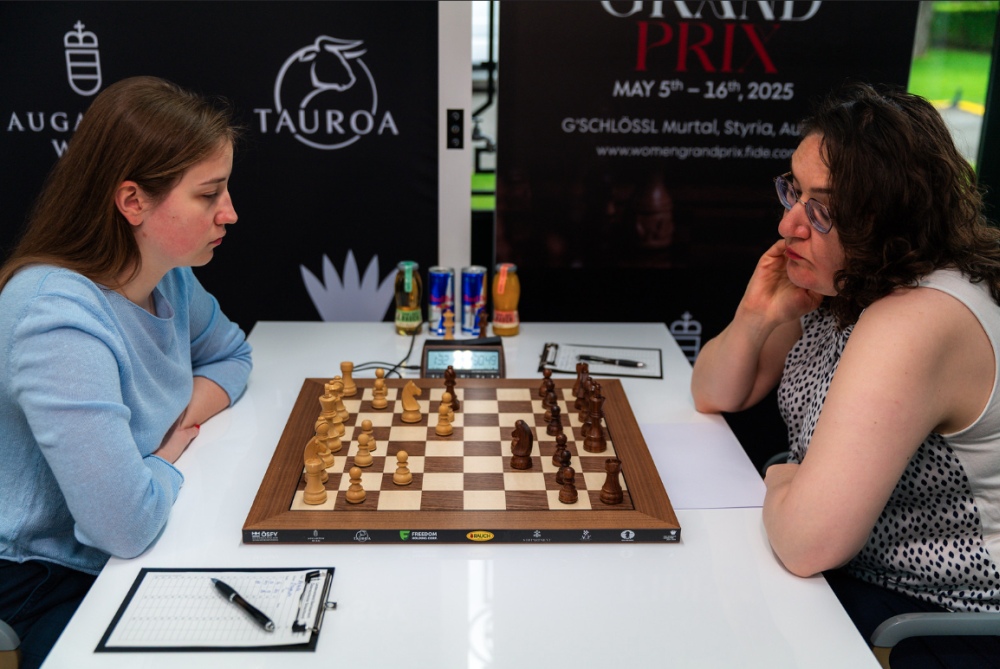
Austria’s Olga Badelka finished the tournament on a high note, defeating Nana Dzagnidze in a game full of tension. In another Nimzo-Indian of the round, White (Badelka) sacrificed two pawns for the initiative in the centre. A sharp position developed, with chances on both sides. The opponents traded mistakes at this stage, but Dzagnidze was the last to err.
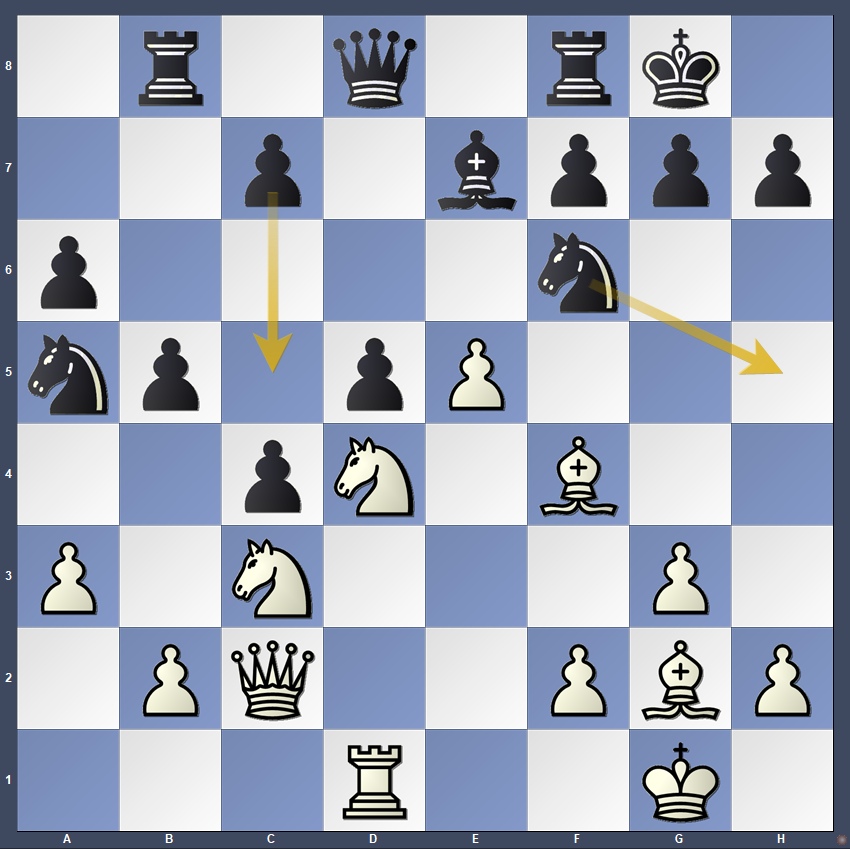
Black should have proceeded with 17…Nh5 18.Nxd5 Nxf4 19.gxf4 c6 20.Nxc6 Nxc6 21.Nf6+ Bxf6 22.Rxd8 Rbxd8 23.Bxc6 Bh4 with a slightly better position. Instead, Nana blundered with 17… c5??
After 18.exf6 Bxf6 18.Nxd5! Bxd4 19.Bc7! Qg5 20.Bxa5 White emerged significantly better: she has a knight for two pawns, a knight in the centre, a pair of bishops and initiative across the board.
Following exciting complications, White transitioned to a winning endgame with two minor pieces and a pawn vs. a rook. It took Olga a while to convert her advantage in this longest game of the round, but slowly, but surely she forced Nana to capitulate.
WGP Austria final standings:

Emil Sutovsky, FIDE CEO: A great day for the players and for chess
Speaking at the closing ceremony, FIDE CEO Emil Sutovsky thanked Austrian Chess Federation President Michael Stöttinger for successfully organising the event.
Sutovsky described the tournament and the conclusion of the Women’s Grand Prix season as “a great day for players and for chess”.
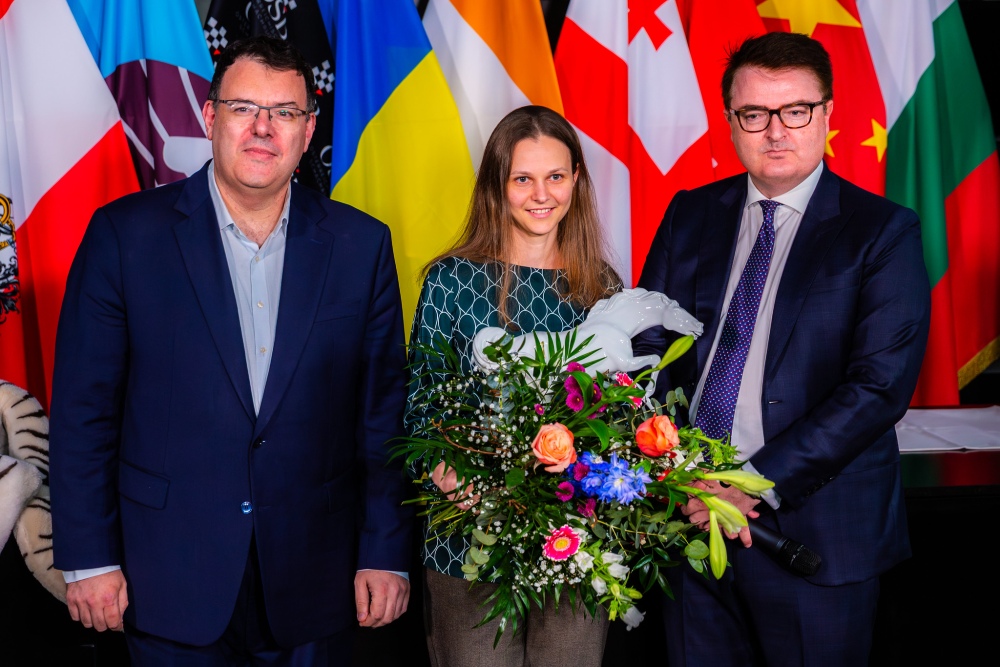
He highlighted FIDE’s ongoing efforts to support women’s chess by providing more tournaments, increased funding, and greater opportunities for female players.
“The players are the real heroes of this event, and I hope they will make a success out of it,” Sutovsky said.
The president of the Austrian Chess Federation, Michael Stöttinger, congratulated the winners and thanked the players.
“This has been a truly great event—one that will have an important place in the history of chess in Austria.”
“My sincere thanks to everyone who made it possible, to players and FIDE. It was a genuine pleasure to witness such fine sportsmanship and passion for chess,” Michael Stöttinger added.
Written by Milan Dinic
Photos: Przemysław Nikiel and politik.steiermark.at/
About the tournament:
The tournament in Grosslobming is the final in a series of six tournaments in the 2024/2025 Women’s Grand Prix cycle.
Format: Ten players play a round-robin tournament (9 rounds). The time control is 90 minutes for the first 40 moves, followed by 30 minutes for the rest of the game, with an increment of 30 seconds per move starting from move 1.
Prize fund: €120,000 distributed among 10 participants based on placement (see Regulations)
For more information about the event, visit: womengrandprix.fide.com/
About the Women’s Grand Prix series
The FIDE Women’s Grand Prix (WGP) Series 2024–25 stands as a premier series in the international women’s chess calendar. In its seventh season, it serves as one of the crucial pathways to the Candidates.
The event comprises six tournaments, hosted in different countries: Georgia, Kazakhstan, Monaco, Cyprus, India and Austria.
The scoring system is conceptualised in a way that favours not just tournament victories, but consistency across events. Each player has a right to play in three out of the six events in the series.
The event is part of FIDE’s World Championship cycle, and the top two players in the WGP will qualify for the 2026 Candidates tournament. The winner of the Candidates will become the challenger to the current Women’s World Champion Ju Wenjun, who successfully defended her title against Tan Zhongyi in their 2025 match.
